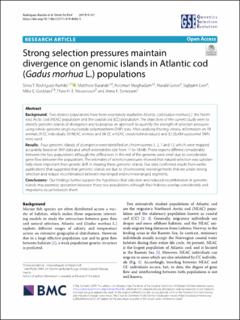| dc.contributor.author | Rodriguez-Ramilo, Silvia T | |
| dc.contributor.author | Baranski, Matthew | |
| dc.contributor.author | Moghadam, Hooman | |
| dc.contributor.author | Grove, Harald | |
| dc.contributor.author | Lien, Sigbjørn | |
| dc.contributor.author | Goddard, Mike E. | |
| dc.contributor.author | Meuwissen, Theodorus | |
| dc.contributor.author | Sonesson, Anna Kristina | |
| dc.date.accessioned | 2020-10-27T12:29:18Z | |
| dc.date.available | 2020-10-27T12:29:18Z | |
| dc.date.created | 2019-12-03T12:30:40Z | |
| dc.date.issued | 2019 | |
| dc.identifier.citation | Genetics Selection Evolution. 2019, 51 (1), . | en_US |
| dc.identifier.issn | 0999-193X | |
| dc.identifier.uri | https://hdl.handle.net/11250/2685255 | |
| dc.description.abstract | Background: Two distinct populations have been extensively studied in Atlantic cod (Gadus morhua L.): the North‑east Arctic cod (NEAC) population and the coastal cod (CC) population. The objectives of the current study were to identify genomic islands of divergence and to propose an approach to quantify the strength of selection pressures using whole-genome single nucleotide polymorphism (SNP) data. After applying fltering criteria, information on 93 animals (9 CC individuals, 50 NEAC animals and 34 CC×NEAC crossbred individuals) and 3,123,434 autosomal SNPs were used.
Results: Four genomic islands of divergence were identifed on chromosomes 1, 2, 7 and 12, which were mapped accurately based on SNP data and which extended in size from 11 to 18 Mb. These regions difered considerably between the two populations although the diferences in the rest of the genome were small due to considerable gene fow between the populations. The estimates of selection pressures showed that natural selection was substantially more important than genetic drift in shaping these genomic islands. Our data confrmed results from earlier publications that suggested that genomic islands are due to chromosomal rearrangements that are under strong selection and reduce recombination between rearranged and non-rearranged segments. Conclusions: Our fndings further support the hypothesis that selection and reduced recombination in genomic islands may promote speciation between these two populations although their habitats overlap considerably and migrations occur between them. | en_US |
| dc.language.iso | eng | en_US |
| dc.rights | Navngivelse 4.0 Internasjonal | * |
| dc.rights.uri | http://creativecommons.org/licenses/by/4.0/deed.no | * |
| dc.title | Strong selection pressures maintain divergence on genomic islands in Atlantic cod (Gadus morhua L.) populations | en_US |
| dc.type | Peer reviewed | en_US |
| dc.type | Journal article | en_US |
| dc.description.version | publishedVersion | en_US |
| dc.source.pagenumber | 15 | en_US |
| dc.source.volume | 51 | en_US |
| dc.source.journal | Genetics Selection Evolution | en_US |
| dc.source.issue | 1 | en_US |
| dc.identifier.doi | 10.1186/s12711-019-0503-5 | |
| dc.identifier.cristin | 1756003 | |
| dc.relation.project | Andre: Spanish Govt. Grant CGL2012-39861-C02-02 | en_US |
| dc.relation.project | Andre: INRA SELGEN funding metaprogram (Project GDivSelGen) | en_US |
| dc.relation.project | Norges forskningsråd: 245504 | en_US |
| cristin.unitcode | 192,10,1,0 | |
| cristin.unitname | Institutt for husdyr- og akvakulturvitenskap | |
| cristin.ispublished | true | |
| cristin.fulltext | original | |
| cristin.qualitycode | 2 | |

